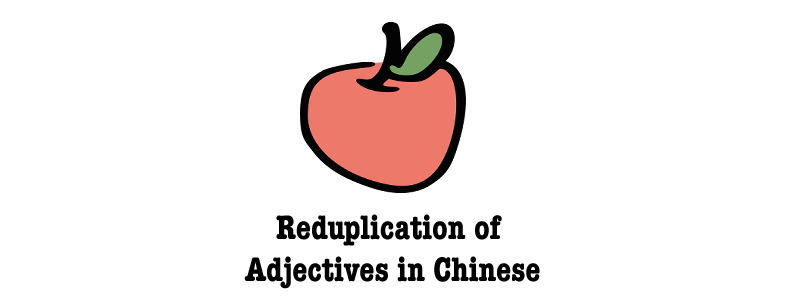Grammar Point:
Reduplication of Chinese adjectives intensify the tone of a statement, similar to the way 很 hěn functions as an intensifier. It reflects the speaker’s subjective feelings rather than objective, factual observation.
Structure
This structure is commonly used in spoken and written Chinese to emphasize a quality or add a sense of lightness, casualness, or emphasis to a description, such as in praise, criticism, baby talk, or storytelling.
AA的 – one-syllable adjectives
這個糖甜甜的,真好吃这个糖甜甜的,真好吃
This candy tastes sweet and delicious.
我喜歡高高瘦瘦的男生我喜欢高高瘦瘦的男生
I like tall and slim guys.
我的狗胖胖的,腿短短的我的狗胖胖的,腿短短的
My dog is chubby with short legs.
巫婆拿出了紅紅的蘋果給白雪公主巫婆拿出了红红的苹果给白雪公主
The witch took out a red apple for Snow White.
告訴媽媽,小小的狗狗在哪裡?告诉妈妈,小小的狗狗在哪里?
Tell mommy, where is the little dog?
AABB的 (+ N) – two-syllable adjectives
加拿大人一直都是客客氣氣的嗎?加拿大人一直都是客客气气的吗?
Are Canadians always very polite?
輕輕鬆鬆的工作很難找轻轻松松的工作很难找
It’s difficult to find an easygoing job.
灰姑娘的姐姐每天都穿得漂漂亮亮的灰姑娘的姐姐每天都穿得漂漂亮亮的
Cinderella’s sister dresses beautifully every day.
我只想過平平穩穩的生活我只想过平平稳稳的生活
I just want to live a steady life.
乾乾淨淨的二手包才能賣好價錢干干净净的二手包才能卖好价钱
Only clean second-hand bags can sell for a good price.
AABB地 + V – two-syllable adjectives
我們今天就舒舒服服地躺在家看電視吧我们今天就舒舒服服地躺在家看电视吧
We will just relax at home and watch TV comfortably today.
所有的書都整整齊齊地放在書櫃裡所有的书都整整齐齐地放在书柜里
All the books are neatly placed in the bookcase.
她坐在長椅上,安安靜靜地看著書她坐在长椅上,安安静静地看着书
She sat on the bench, quietly reading a book.
請你認認真真地回答我请你认认真真地回答我
Please answer me seriously.
從此以後,王子就和公主快快樂樂地生活在一起从此以后,王子就和公主快快乐乐地生活在一起
From then on, the prince and princess lived happily together.
Common Mistakes
你家真的很乾乾淨淨的你家真的很干干净净的 ❌
(Do not add any intensify adverb in front of the adjectives.)
給我一杯大大的咖啡给我一杯大大的咖啡 ❌
(Large size in not a subjective feelings, it’s a fact.)
這個水果甜甜这个水果甜甜 ❌
(Missing 的 de.)
你每天都快樂快樂嗎?你每天都快乐快乐吗? ❌
(Wrong structure.)
Not all adjectives can be reduplicated
It’s important to note that not all adjectives are suitable for reduplication in Chinese, and attempting to reduplicate some adjectives might not result in a meaningful expression or could be grammatically incorrect. And how can you know which ones can be reduplicated? You can only remember them.
Here are some common adjectives that cannot be reduplicated:
貴贵 expensive
便宜便宜 cheap
近近 near
遠远 far
新新 new
多多 many
忙忙 busy
累累 tired
無聊没有意思 bored
不錯不错 not bad
喜歡喜欢 like
討厭讨厌 hate
有名有名 famous
方便方便 convenient
好吃好吃 delicious
複雜复杂 complicated
美麗美丽 beautiful
強强 strong
年輕年轻 young
難难 difficult
容易容易 easy
有趣有意思 interesting
緊張紧张 nervous
難過难过 sad


